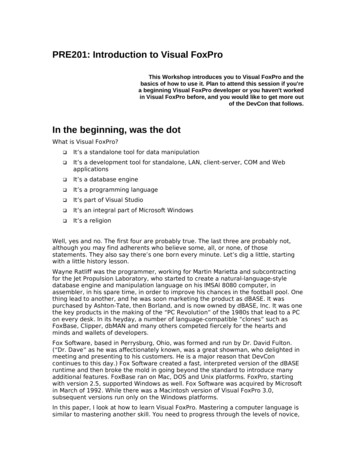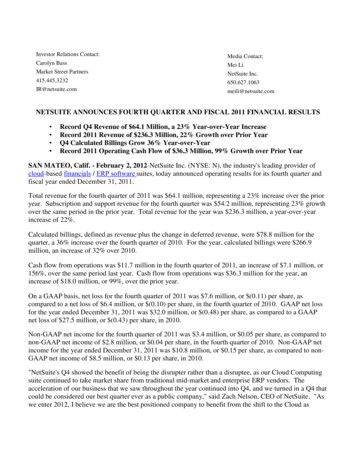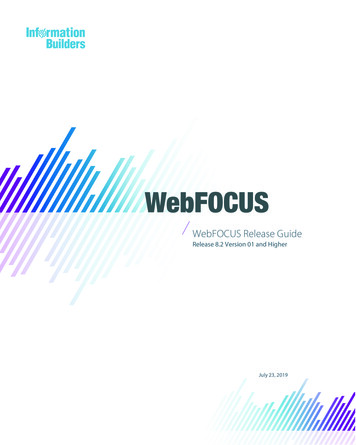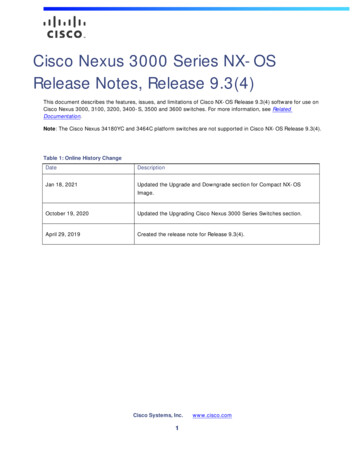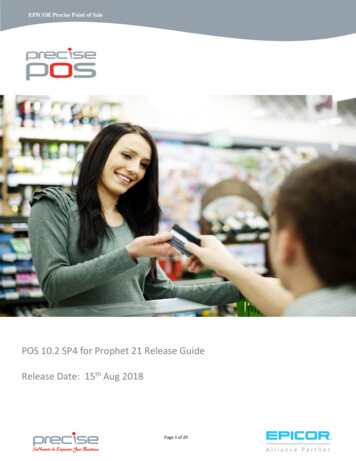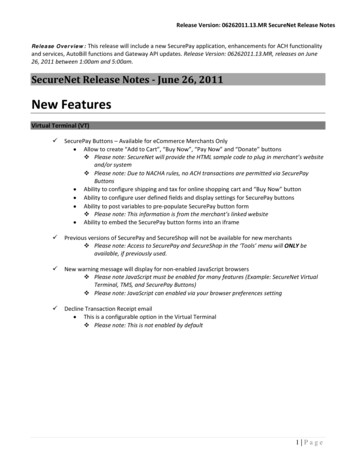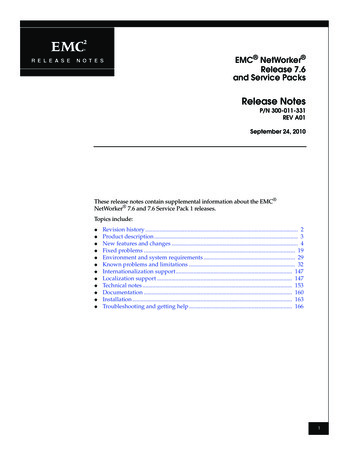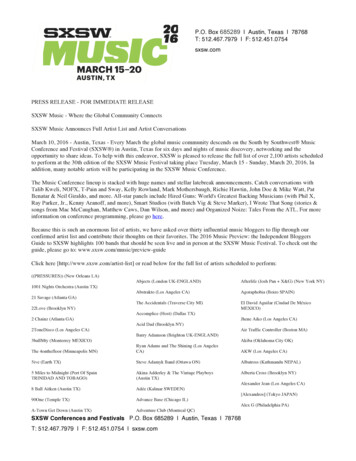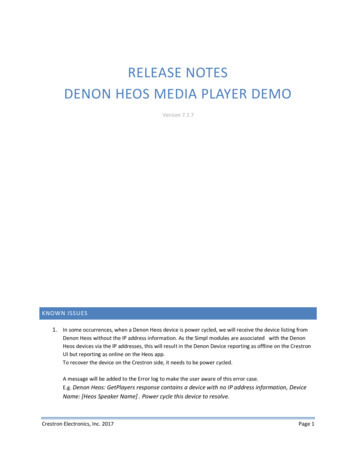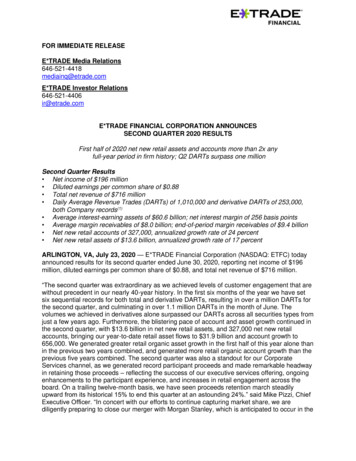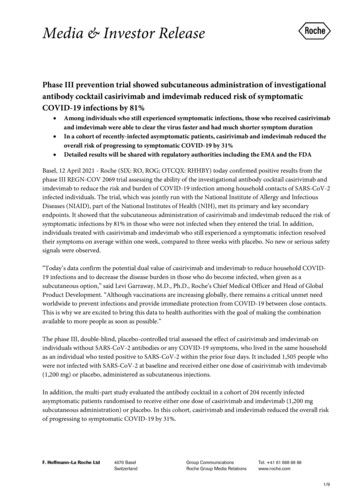
Transcription
Media & Investor ReleasePhase III prevention trial showed subcutaneous administration of investigationalantibody cocktail casirivimab and imdevimab reduced risk of symptomaticCOVID-19 infections by 81% Among individuals who still experienced symptomatic infections, those who received casirivimaband imdevimab were able to clear the virus faster and had much shorter symptom durationIn a cohort of recently-infected asymptomatic patients, casirivimab and imdevimab reduced theoverall risk of progressing to symptomatic COVID-19 by 31%Detailed results will be shared with regulatory authorities including the EMA and the FDABasel, 12 April 2021 - Roche (SIX: RO, ROG; OTCQX: RHHBY) today confirmed positive results from thephase III REGN-COV 2069 trial assessing the ability of the investigational antibody cocktail casirivimab andimdevimab to reduce the risk and burden of COVID-19 infection among household contacts of SARS-CoV-2infected individuals. The trial, which was jointly run with the National Institute of Allergy and InfectiousDiseases (NIAID), part of the National Institutes of Health (NIH), met its primary and key secondaryendpoints. It showed that the subcutaneous administration of casirivimab and imdevimab reduced the risk ofsymptomatic infections by 81% in those who were not infected when they entered the trial. In addition,individuals treated with casirivimab and imdevimab who still experienced a symptomatic infection resolvedtheir symptoms on average within one week, compared to three weeks with placebo. No new or serious safetysignals were observed.“Today’s data confirm the potential dual value of casirivimab and imdevimab to reduce household COVID19 infections and to decrease the disease burden in those who do become infected, when given as asubcutaneous option,” said Levi Garraway, M.D., Ph.D., Roche’s Chief Medical Officer and Head of GlobalProduct Development. “Although vaccinations are increasing globally, there remains a critical unmet needworldwide to prevent infections and provide immediate protection from COVID-19 between close contacts.This is why we are excited to bring this data to health authorities with the goal of making the combinationavailable to more people as soon as possible.”The phase III, double-blind, placebo-controlled trial assessed the effect of casirivimab and imdevimab onindividuals without SARS-CoV-2 antibodies or any COVID-19 symptoms, who lived in the same householdas an individual who tested positive to SARS-CoV-2 within the prior four days. It included 1,505 people whowere not infected with SARS-CoV-2 at baseline and received either one dose of casirivimab with imdevimab(1,200 mg) or placebo, administered as subcutaneous injections.In addition, the multi-part study evaluated the antibody cocktail in a cohort of 204 recently infectedasymptomatic patients randomised to receive either one dose of casirivimab and imdevimab (1,200 mgsubcutaneous administration) or placebo. In this cohort, casirivimab and imdevimab reduced the overall riskof progressing to symptomatic COVID-19 by 31%.F. Hoffmann-La Roche Ltd4070 BaselSwitzerlandGroup CommunicationsRoche Group Media RelationsTel. 41 61 688 88 88www.roche.com1/9
Detailed results from the trial will be shared with regulatory authorities as soon as possible. Regeneron willshare new data with the United States (U.S.) Food and Drug Administration (FDA) and Roche andRegeneron will continue to work with the European Medicines Agency (EMA) and other health authoritiesacross the globe.The antibody cocktail continues to be evaluated in clinical trials in multiple settings for COVID-19: in nonhospitalised and certain hospitalised patients, including the open-label RECOVERY trial of hospitalisedpatients in the UK. As of April 2021, more than 25,000 people have participated in clinical trials involvingcasirivimab and imdevimab.In these exceptional times, Roche stands together with society, governments, healthcare providers and allthose working to overcome the pandemic.Table 1: Key results from phase III prevention cohort in uninfected individuals*Casirivimab andimdevimab(1,200 mgsubcutaneous dose)Placebon 753n 752Proportion of subjects with symptomatic SARS-CoV-2 infections through day 29 (primary endpoint)Risk reduction81%(p 0.0001)# of patients with events11 (1.5%)59 (7.8%)Symptoms and viral loadTotal weeks with symptomsReduction93%(p 0.0001)Total # of weeks (cumulative for all individuals ineach arm)F. Hoffmann-La Roche Ltd4070 BaselSwitzerland13Group CommunicationsRoche Group Media Relations188Tel. 41 61 688 88 88www.roche.com2/9
# of weeks with symptoms (mean) in symptomaticindividuals1.23.2Total weeks with high viral load ( 104 copies/mL)Reduction90%(p 0.0001)Total # of weeks (cumulative for all individuals ineach arm)14136# of weeks with high viral load (mean) in qPCRpositive subjects0.41.3*Individuals without any COVID-19 symptoms who lived in the same household as an individualwho tested positive to SARS-CoV-2 within the prior four days. Based on the seronegativemodified Full Analysis Set population, which includes all randomized subjects without evidenceof current or prior SARS-CoV-2 infection (i.e., a negative RT-qPCR test and a negative antibodytest) at randomization.Adverse events (AEs) occurred in 20% (n 265 out of 1,311) of REGEN-COV participants and 29% (n 379out of 1,306) of placebo participants, and serious AEs occurred in 1% (n 10) of REGEN-COV participantsand 1% (n 15) of placebo participants. There were 0 REGEN-COV participants and 4 placebo participantswho were either hospitalized or visited the emergency room because of COVID-19 during the 29-day efficacyassessment period. Injection site reactions, all of which were grades 1-2, occurred in 4% (n 55) of REGENCOV participants and 2% (n 19) of placebo participants. No individuals from either group withdrew fromthe trial due to AEs, and none of the deaths in the trial (2 REGEN-COV, 2 placebo) were attributed toCOVID-19 or study drug.F. Hoffmann-La Roche Ltd4070 BaselSwitzerlandGroup CommunicationsRoche Group Media RelationsTel. 41 61 688 88 88www.roche.com3/9
Table 2: Key results from phase III treatment cohort in asymptomatic infected individualsCasirivimab andimdevimab(single 1,200 mg dose)Placebon 100n 104Proportion of subjects with symptomatic SARS-CoV-2 infections through day 29 (primary endpoint)Risk reduction31%(p 0.0380)# of patients with events (cumulative for allindividuals in each arm)29 (29%)44 (42%)Symptoms, viral load and COVID-19 related eventsTotal weeks with symptomsReduction45%(p 0.0273)Total # of weeks (cumulative for all individualsin each arm)90170Total weeks with high viral load ( 104 copies/mL)Reduction40%(p 0.001)Total # of weeks4882Based on the seronegative modified Full Analysis Set population, which includes all randomizedasymptomatic patients who were SARS-CoV-2 positive but had no evidence of prior infection(i.e., a positive RT-qPCR test and a negative antibody test) at randomizationF. Hoffmann-La Roche Ltd4070 BaselSwitzerlandGroup CommunicationsRoche Group Media RelationsTel. 41 61 688 88 88www.roche.com4/9
Adverse events (AEs) occurred in 34% (n 52 out of 155) of REGEN-COV patients and 48% (n 75 out of156) of placebo patients, and serious AEs occurred in 0% (n 0) of REGEN-COV patients and 3% (n 4) ofplacebo patients. Injection site reactions, all of which were grades 1-2, occurred in 4% (n 6) of REGEN-COVpatients and 1% (n 1) of placebo patients. No patients from either group withdrew from the trial due to AEs,and there were no deaths.About REGN-COV 2069REGN-COV 2069 is a phase III, randomised, double-blind, placebo-controlled multi-part study assessing theefficacy and safety of casirivimab and imdevimab in preventing symptomatic infection in household contactsof individuals infected with COVID-19.In January 2021, initial data from the trial showed that there was a reduction in overall infections seen withcasirivimab and imdevimab within the first week, with approximately 50% lower overall rates of infection(symptomatic and asymptomatic) and 100% prevention of symptomatic infections. Casirivimab andimdevimab showed efficacy when administered via a low-dose (1,200 mg) subcutaneous route.In the safety assessment of these patients, adverse events occurred more frequently in participants on placeboduring the efficacy analysis period (12% in the casirivimab and imdevimab group and 18% in the placebogroup) and during the follow-up period (11% in the casirivimab and imdevimab group and 20% in theplacebo group).About casirivimab and imdevimabCasirivimab and imdevimab is a cocktail of two monoclonal antibodies (also known as REGN10933 andREGN10987, respectively) and was designed by Regeneron scientists to block infectivity of SARS-CoV-2, thevirus that causes COVID-19. They evaluated thousands of fully-human antibodies produced by thecompany's proprietary VelocImmune mice, which have been genetically modified to have a human immunesystem, as well as antibodies identified from humans who have recovered from COVID-19.The two potent, virus-neutralising antibodies casirivimab and imdevimab are believed to bind noncompetitively to the critical receptor binding domain of the virus's spike protein, which is hypothesised todiminish the ability of mutant viruses to escape treatment and to protect against spike variants that may arisein the human population, as detailed in Science publications.The cocktail of casirivimab and imdevimab has not been granted a marketing authorisation by any healthauthority. In November 2020, the antibody cocktail was authorised by the United States (U.S.) Food andDrug Administration (FDA) under an Emergency Use Authorization (EUA) for the treatment of mild tomoderate COVID-19 in adults and paediatric patients (12 years of age and older weighing at least 40 kg) withpositive results of direct SARS-CoV-2 viral testing, and who are at high risk for progressing to severeCOVID-19 and/or hospitalisation. The US EUA is temporary and does not take the place of the formalbiologics license application (BLA) submission, review and approval process.F. Hoffmann-La Roche Ltd4070 BaselSwitzerlandGroup CommunicationsRoche Group Media RelationsTel. 41 61 688 88 88www.roche.com5/9
In February 2021, the European Medicines Agency’s (EMA) Committee for Medicinal Products for HumanUse (CHMP) issued a scientific opinion under Article 5(3) of Regulation 726/2004 supporting the use ofcasirivimab and imdevimab as a treatment option for patients with confirmed COVID-19 who do not requireoxygen supplementation and who are at high risk of progressing to severe COVID-19. The scientific opinioncan be considered by EU member states when making decisions on the use of medicines at a national levelbefore a formal authorisation is issued. The review under Article 5(3) was separate, but ran in parallel to therolling review of casirivimab and imdevimab, which is currently ongoing by the EMA.Casirivimab and imdevimab’s development, manufacturing and clinical trials have been funded in part bythe Biomedical Advanced Research and Development Authority (BARDA), part of the Office of the AssistantSecretary for Preparedness and Response at the US Department of Health and Human Services under OTnumber: HHSO100201700020C.About U.S. FDA EUA statusCasirivimab and imdevimab have not been Food and Drug Administration (FDA) cleared or approved in theUnited States (US). It has been authorised by the FDA under an Emergency Use Authorization (EUA) duringthe current public health emergency for the treatment of mild to moderate COVID-19 in adults andpaediatric patients (12 years of age and older weighing at least 40 kg) with positive results of direct SARSCoV-2 viral testing, and who are at high risk for progressing to severe COVID-19 and/or hospitalisation.Please see the Fact Sheet for Healthcare Providers for more information, including important safetyinformation. The cocktail is only authorised for the duration of the declaration that circumstances existjustifying the authorisation of the emergency use under section 564(b)(1) of the Act, 21 U.S.C. §360bbb3(b)(1), unless the declaration is terminated or authorisation revoked sooner.About Roche’s response to the COVID-19 pandemicAs a leading healthcare company we are doing all we can to support countries in their fight against COVID19 and minimising its impact. We have developed a growing number of diagnostic solutions that help todetect and diagnose the infection, as well as providing digital support to healthcare systems. We alsocontinue to identify, develop and support potential therapies which can play a role in treating the disease.The impact of COVID-19 goes beyond those who contract it. That is why we are working with healthcareproviders, laboratories, authorities and organisations to help make sure patients continue to receive the tests,treatment and care they need during these challenging times. Building on a longstanding tradition ofpartnerships, we are working together with governments and others to make healthcare stronger and moresustainable in the future.Reliable, high-quality testing is essential to help healthcare systems overcome this pandemic and Roche hasso far launched 16 diagnostics solutions to help minimise the impact of COVID-19. As soon as the novelSARS-CoV-2 virus was sequenced in early 2020, we got to work. On 13 March 2020 we became the firstF. Hoffmann-La Roche Ltd4070 BaselSwitzerlandGroup CommunicationsRoche Group Media RelationsTel. 41 61 688 88 88www.roche.com6/9
company to receive U.S. Food and Drug Administration (FDA) Emergency Use Authorization (EUA) for ahigh-volume molecular test to detect the virus. Since then, we have continued to add a range of diagnosticssolutions to our global portfolio to help in the fight against COVID-19. In addition to the gold standard PCRtest, we have developed antigen tests to help diagnose the virus in settings where there is limited molecularlaboratory infrastructure, rapid antigen where the virus can be detected on the spot, tests that can test forboth flu and COVID-19 at the same time, both high throughput and at the point of care, and tests that candetect virus antibodies that can help monitor the spread of the virus and can also support in vaccinedevelopment. On 16 March 2021 the SARS-CoV-2 variant test was launched, designed to detect key spikemutations.Aside from these tests we have also looked at how we can support care for patients who have COVID-19,receiving an FDA EUA for the Elecsys IL-6 test to assist in identifying severe inflammatory response inpatients with confirmed COVID-19, as well as launching Roche v-TAC, a digital algorithm that could helpsimplify the screening, diagnosis and monitoring of respiratory-compromised patients with COVID-19.Roche is working closely with governments and health authorities around the world, and has significantlyincreased production to support availability of tests globally.Roche is actively involved in understanding the potential of the existing portfolio and is researching optionsfor the future. In 2020, Roche entered into a number of new partnerships, including with Gilead, Regeneronand Atea, to develop, manufacture and distribute molecules that can potentially both treat and preventCOVID-19.In October, Roche announced a partnership with Atea Pharmaceuticals to jointly develop the investigationalcompound AT-527. If approved, Atea will distribute AT-527 in the United States (US) and Roche will beresponsible for global manufacturing and distribution outside the US. Atea’s compound has the potential tobe the first oral antiviral to treat COVID-19 patients outside the hospital setting as well as in the hospital. Itsanticipated formulation (pill) could allow for large-scale manufacturing and may help to facilitate access to abroad patient population.In November, our partner Regeneron received FDA EUA for casirivimab and imdevimab, its investigationalantiviral antibody combination, for the treatment of recently diagnosed patients with mild to moderateCOVID-19 who are at high risk of progressing to severe COVID-19 and/or hospitalisation. The antibodycocktail is currently being studied in two phase I-III adaptive clinical trials for the treatment of COVID-19and in a phase III trial for the prevention of the disease. As part of the global partnership with Regeneron, weare committing a significant amount of manufacturing capacity and are working to expand supply of thisantibody combination beyond the US to as many people as possible.In addition, we are exploring the potential of our investigational molecules and existing portfolio: Forexample, Roche has initiated three global phase III clinical trials investigating the safety and efficacy ofActemra/RoActemra in COVID-19 associated pneumonia (COVACTA, EMPACTA and REMDACTA).F. Hoffmann-La Roche Ltd4070 BaselSwitzerlandGroup CommunicationsRoche Group Media RelationsTel. 41 61 688 88 88www.roche.com7/9
Following initial interactions with health authorities, Roche will continue to monitor the evolving clinicalevidence for Actemra/RoActemra in this setting.About RocheRoche is a global pioneer in pharmaceuticals and diagnostics focused on advancing science to improvepeople’s lives. The combined strengths of pharmaceuticals and diagnostics under one roof have made Rochethe leader in personalised healthcare – a strategy that aims to fit the right treatment to each patient in the bestway possible.Roche is the world’s largest biotech company, with truly differentiated medicines in oncology, immunology,infectious diseases, ophthalmology and diseases of the central nervous system. Roche is also the world leaderin in vitro diagnostics and tissue-based cancer diagnostics, and a frontrunner in diabetes management.Founded in 1896, Roche continues to search for better ways to prevent, diagnose and treat diseases and makea sustainable contribution to society. The company also aims to improve patient access to medicalinnovations by working with all relevant stakeholders. More than thirty medicines developed by Roche areincluded in the World Health Organization Model Lists of Essential Medicines, among them life-savingantibiotics, antimalarials and cancer medicines. Moreover, for the twelfth consecutive year, Roche has beenrecognised as one of the most sustainable companies in the Pharmaceuticals Industry by the Dow JonesSustainability Indices (DJSI).The Roche Group, headquartered in Basel, Switzerland, is active in over 100 countries and in 2020 employedmore than 100,000 people worldwide. In 2020, Roche invested CHF 12.2 billion in R&D and posted sales ofCHF 58.3 billion. Genentech, in the United States, is a wholly owned member of the Roche Group. Roche isthe majority shareholder in Chugai Pharmaceutical, Japan. For more information, please visitwww.roche.com.All trademarks used or mentioned in this release are protected by law.F. Hoffmann-La Roche Ltd4070 BaselSwitzerlandGroup CommunicationsRoche Group Media RelationsTel. 41 61 688 88 88www.roche.com8/9
Roche Group Media RelationsPhone: 41 61 688 8888 / e-mail: media.relations@roche.comDr. Nicolas DunantPhone: 41 61 687 05 17Patrick BarthPhone: 41 61 688 44 86Dr. Daniel GrotzkyPhone: 41 61 688 31 10Karsten KleinePhone: 41 61 682 28 31Nina MählitzPhone: 41 79 327 54 74Nathalie MeetzPhone: 41 61 687 43 05Dr. Barbara von SchnurbeinPhone: 41 61 687 89 67Roche Investor RelationsDr. Karl MahlerPhone: 41 61 68-78503e-mail: karl.mahler@roche.comJon Kaspar BayardPhone: 41 61 68-83894e-mail: jon kaspar.bayard@roche.comDr. Sabine BorngräberPhone: 41 61 68-88027e-mail: sabine.borngraeber@roche.comDr. Bruno EschliPhone: 41 61 68-75284e-mail: bruno.eschli@roche.comDr. Birgit MasjostPhone: 41 61 68-84814e-mail: birgit.masjost@roche.comDr. Gerard TobinPhone: 41 61 68-72942e-mail: gerard.tobin@roche.comInvestor Relations North AmericaLoren KalmPhone: 1 650 225 3217e-mail: kalm.loren@gene.comDr. Lisa
Roche Group Media Relations Tel. 41 61 688 88 88 www.roche.com 2/9 Detailed results from the trial will be shared with regulatory authorities as soon as possible. Regeneron will share new data with the United States (U.S.) Food and Drug Administrat
